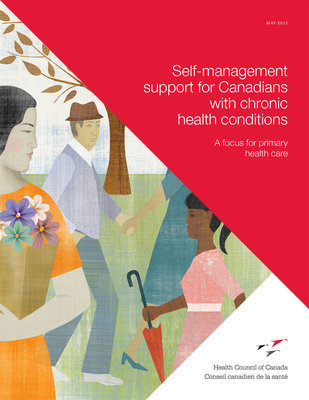 May 25, 2012 – The Health Council of Canada (HCC) released a report recommending that “all health care systems across Canada move actively to provide self-management supports in a more systematic way,” especially for Canadians with chronic conditions.
May 25, 2012 – The Health Council of Canada (HCC) released a report recommending that “all health care systems across Canada move actively to provide self-management supports in a more systematic way,” especially for Canadians with chronic conditions.
Self-management support is defined as “the systematic provision of education and supportive interventions, by health care staff (and others), to increase patient’s skills and confidence in managing their health problems, including regular assessment of progress and problems, goal setting, and problem-solving support.”
Evidence has shown that self-management supports help patients manage their symptoms more effectively. For example, patients with diabetes were better able to control their blood sugar levels and arthritis patients reported reduced pain and disability when encouraged to join discussion groups and received disease specific education and self-management skills.
An Integrative Approach to Continuing Care
This success has been due to the partnerships between patients and health providers and collaborative efforts between health providers. Since people have increasingly complex chronic health conditions, self-management supports place an emphasis on inter-professional teams. The report promotes a team-based approach to primary health care. Health practitioners should be the primary point of contact for patients and an on-going anchor in a self-management support.
One of the leading examples of self-management is called is the Stanford Chronic Disease Self-Management Program, which was developed and licensed by Stanford University. It is a program where a group of participants with chronic condition as well as their families, friends and/or caregivers are led through workshops of practical “how-to” techniques on topics such as exercise and healthy eating, pain and stress reduction, and dealing with emotions like anger and depression. Due to its popularity and flexibility, the program has been modified and adopted worldwide to 24 countries, including Canada.
With large percentages of Canadians suffering from one or more chronic diseases, it is costing us $90 billion a year in lost productivity and health care costs. In other words, our health care system is failing to help people with chronic disease when they leave the doctor’s office and, if nothing is changed, those costs to society will rise. Fortunately, the report states that self-management can bring improvement, and it highlights ways to promote and provide self-management support to Canadians with chronic health conditions.
Although it is widely recognized that self-management care should be a routine part of primary health care, it is not yet in Canada. For now, Canada’s efforts on self-management are fragmented. As such, the Health Council of Canada’s recommends that governments across Canada:
1. Create an integrated, system-wide approach to self-management support, where monitoring takes place against health system performance objectives, measures, and targets.
2. Enable primary health care providers to deliver self-management support as a routine part of care through training of effective and innovative techniques and redesign of funding models and practices.
3. Broaden and deepen efforts to reach more Canadians who need self-management support by ensuring that it is accessible to patients of different cultures, languages, and literacy skills.
4. Engage patients and informal caregivers as a key part of any systemic approach.
The Health Council of Canada’s recommendations reflect CARP’s advocacy on caring for Canadians with chronic conditions. In fall of 2011, CARP made a submission to the House of Commons Standing Committee on Health emphasizing the importance of primary care and the need to promote greater access to comprehensive primary care, especially in underserved communities. CARP also recommended that the government implement a national health promotion strategy that includes health promotion and chronic disease management education. Although it is good to know that there is wide agreement on the direction we need to take to salvage our failing health care system, what we really need is action.
Read CARP’s Chronic Disease Submission to Federal Government

